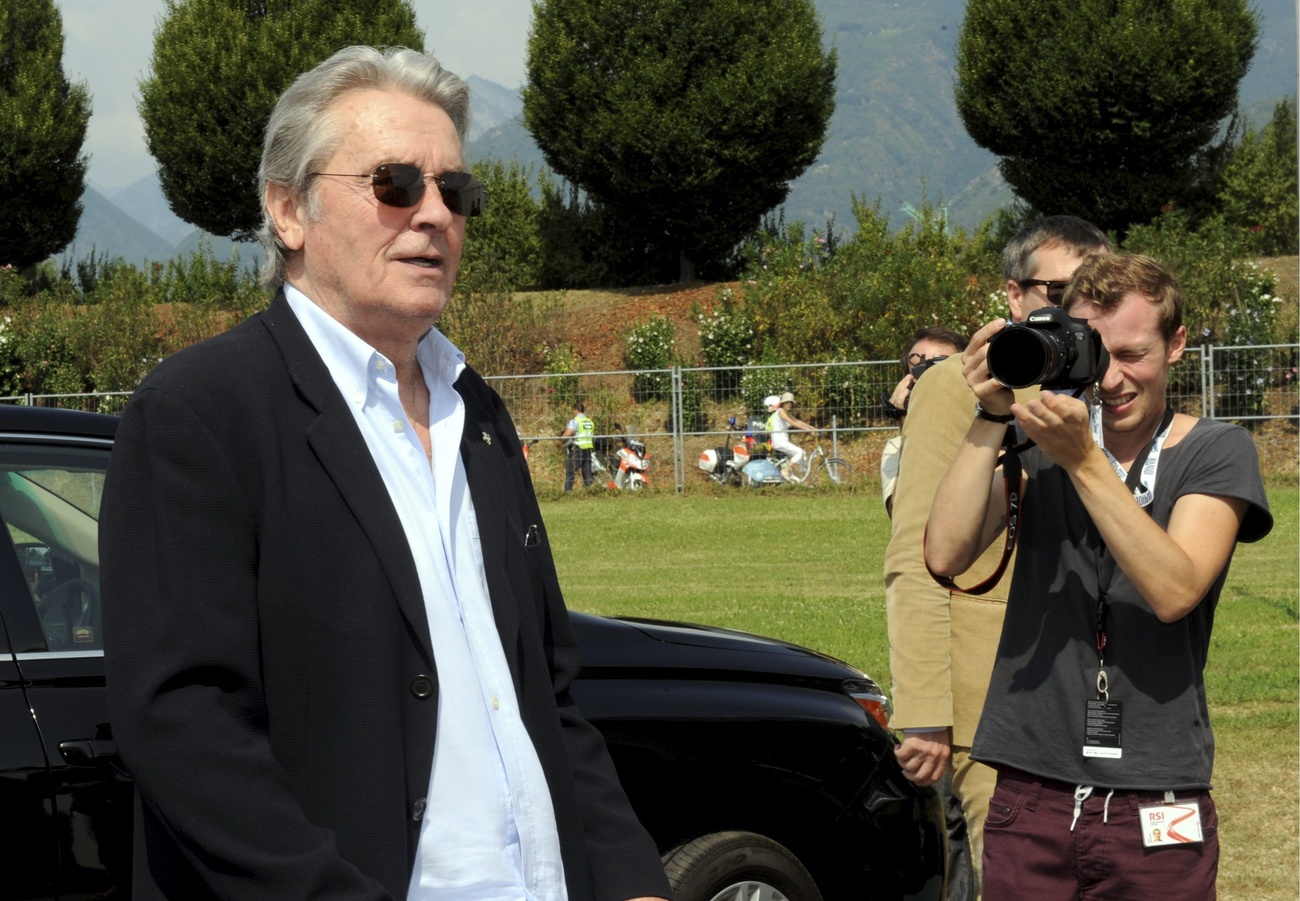Explainer: Why Switzerland remains a ‘big buyer’ of Russian gold

Swiss imports of Russian gold have soared since Russia invaded Ukraine, customs figures show. SWI swissinfo.ch explains how gold helps sustain Russia’s war effort and why Russian gold still finds its way to Switzerland.
Why is gold – still – important to Russia’s economy?
Gold plays a crucial role in Russia’s economy, especially as the country navigates international sanctions over its war on Ukraine. Despite facing over 16,000 sanctions across strategic sectors, the Russian economy has shown resilience, registering a notable growth rate of 3.6% in 2023. This year the economy grew 5.4% in the first quarter and 4% in the second, according to official figures.
Russia is the second-largest gold producer in the world, contributing around 10% of global output. The gold industry remains strong, with seven large mining projects underway and a projected 4% annual increase in production until 2026, according to mining industry reports. This production supports the war-time economy as Russia exports gold to countries that did not impose sanctions.
Gold serves as a hedge against political risks and global financial turbulence. For Russia, gold reserves have been a strategic asset, helping to maintain economic stability amid sanctions. Russia has been trying to distance its economy from the US dollar for a decade by making more trade payments in other currencies. Facing sanctions, the Russian government expressed in early 2022 its intention to link the rouble to gold. The BRIC economiesExternal link have been exploring a common currency backed by a basket of commodities including gold.
Global central bank demand for gold began an upward swing in 2022, propelling the price of gold to a series of record-shattering highs. The shiny metal hit its all-time highest price of $2,530.30 (CHF2,150) per troy ounce on August 20, 2024. This has been great news for Russia.

How is gold covered by international sanctions?
International sanctions, including those from Switzerland, prohibit the import of Russian gold produced after the war began. These sanctions aim to limit Russia’s ability to finance its war effort in Ukraine. However, enforcement of these sanctions is complex.
Swiss sanctions on Russian gold came into effect on August 3, 2022. Refineries quickly sought guidance External linkfrom the Swiss government on how to ensure that gold originating from Russia and exported to the EU or a third country is not imported into Switzerland. Companies do the heavy lifting on due diligence with the help of auditors. Swiss customs have the power to inspect the flow of gold for potential violations and to bring cases to the State Secretariat for Economic Affairs (SECO) for further investigation.
“If there are indications or suspicions of a violation of sanctions law, SECO will systematically investigate,” SECO told SWI swissinfo.ch in an email.
Have the Swiss caught any violations of gold sanctions?
Authorities state that Switzerland’s imports of Russian gold have so far been compliant with sanctions. “The Federal Office for Customs and Border Security inspected the imports and found no violations of the applicable sanctions,” it said in response to written questions from SWI swissinfo.ch on the latest Russian gold import figures.
Why is Russian gold still making its way into Switzerland?
Gold of Russian origin continues to make its way into Switzerland largely because the gold imported is from stocks stored in London vaults before the Ukraine conflict. These stocks are not covered by current sanctions, allowing Swiss refineries to legally source and process this gold.
The significant increase in Swiss imports of Russian gold from 17.5 tonnes in 2021 to 63.4 tonnes in 2023 reflects this ongoing trade. However, the nature of these imports raises concerns about potential “gold laundering”, where the origin of the gold is obscured once it is processed by refineries.
The London Bullion Market Association (LBMA), the standard-setting body for the global wholesale market for precious metals, used to have six Russian refineries among its members. As a result, London vaults filled up over the years with bars of Russian gold, which were widely valued by the gold industry for their high level of refinement.
The Russian refineries were suspended by the LBMA on March 7, 2022 – just weeks after the start of the war.
“When sanctions came out globally, we had already suspended our Russian refiners. But there were existing stocks,” explains LBMA Chief Executive Ruth Crowell. “Part of [the challenge] is demonstrating, particularly the older stocks, that they have been sitting outside in a secure vault well before those sanctions were put in place.”
The amount of gold being imported into Switzerland from London and identified as Russian origin suggests that these older stocks represent substantial volumes. “We don’t know the exact quantity of Russian gold in London vaults,” says Marc Ummel, head of the raw materials unit of Swissaid.
Who is buying Russian gold in Switzerland?
Swiss imports of Russian gold shifted from 2022 to 2023, with gold refineries overtaking financial institutions as the main buyers. Customs data shows refineries and financial institutions bought Russian gold in comparable, relatively low amounts in 2021. In 2023, refineries bought almost twice as much gold as financial institutions.
“This is related to the fact that as the war continues, no one wants to have Russian gold in their funds, particularly some ETFs [exchange-traded funds, a type of investment fund] which give more information and are more transparent [than refiners] about where the gold they have in their fund comes from,” explains Ummel. “When it goes to a refinery, you just change the origin of the gold. It’s a kind of laundering of the gold.”
Refining bars of any origin in Switzerland gives them the Swiss stamp of approval and it becomes impossible to ascertain where the gold originated from.
Buying gold that was mined and refined in Russia before the war is legal. But the difficulties ascertaining the origin of gold – which can be refined and re-refined, thus removing any indications of its real origin – adds up to reputational risks and compliance headaches that many actors in the gold industry would rather avoid, and so they stopped sourcing Russian gold altogether.
So where in the world is Russian gold going?
Russian gold has been primarily rerouted to Hong Kong and the United Arab Emirates (UAE), according to media reports and industry sources.
The United Nations Comtrade database does not have export data for Russia beyond 2021.
Import data submitted by countries to Comtrade paint a partial picture of these gold flows. They show, for example, that the United Kingdom was a top importer of Russian gold in 2021 but scaled back in 2022, presumably as sanctions took effect. The UK declared importing 264.2 tonnes of Russian gold in 2021 and only 42.5 tonnes in 2022. The UK declared no gold imports from Russia in 2023.
Available import figures on the same database so far show that Hong Kong topped the list in 2023, buying 82.2 tonnes of Russian gold. That compares to just 10.6 tonnes in 2022 and 1.5 tonnes in 2021. Imports of Russian gold into the UAE rose to 96.4 tonnes in 2022, up from 6.1 tonnes in 2021. The UAE’s import figures for 2023 are yet to be published by Comtrade.
Armenia became a top buyer of Russian gold in 2023, importing 34.3 tonnes that year compared to 1.2 tonnes in 2021 and 4.4 tonnes in 2022. The database does not differentiate between gold that was imported directly from Russia or purchases of Russian gold made in a third country.
How can we distinguish between licit and illicit Russian gold?
The issue of Russian gold has spurred calls for greater transparency and efforts towards more rigorous tracking of gold as a commodity. The LBMA gets data from its refineries manually on an annual basis and from vaults monthly. The war on Ukraine and subsequent sanctions on Russia pushed the gold body to make an inventory of Russian bars stored in London.
The LBMA announced at its Sustainability and Responsible Sourcing Summit in March the appointment of Swiss company aXedras as the official provider for its newly established Gold Bar Integrity (GBI) database, set to launch later in 2024. The database will help the market authority see and crunch the numbers in real time.
One of the use cases of the platform developed by aXedras, which Swiss refineries are embracing, is to efficiently demonstrate compliance with sanctions.
What are the loopholes and who monitors compliance?
Swiss customs authorities rely on truthful declarations of origin. As part of their risk-based control activities, customs can determine the country of origin of the gold based on the attached documents or melting marks on the bars. Suspected violations of Swiss laws or sanctions are then reported to SECO.
“We have to be careful with the data because it is possible that it is not so precise,” cautions Ummel in reaction to Swiss customs data on Russia gold imports. “The loopholes are at different levels. What people declare here can be questionable.” He also notes transporters bringing gold of different origins from the United Kingdom sometimes just declare the biggest origin of the lot.
While Swiss authorities claim compliance with sanctions, the potential for newly mined Russian gold to enter Switzerland through third countries remains a significant concern. Experts assess there is a higher risk of post-war Russian gold reaching Switzerland through the UAE or Hong Kong than the UK. These two nations are major importers of Russian gold, whereas London ceased its imports of Russian gold after the war.
Globally, are the sanctions working?
Russia, one of the most-sanctioned countries in the world, has proven adept at evading sanctions. The inability of sanctions to bring about a change in Russia’s behaviour raises questions about their enforcement and effectiveness in Western corridors of power. In the UK, the Treasury Committee initiated an inquiry this year to assess whether its economic sanctions effectively hinder the war effort.
When asked if a similar assessment was warranted or in progress in Switzerland, SECO outlined the achievements of the sanctions so far. It highlighted that the efforts of sanctioning states had led to the immobilisation of CHF253 billion ($297 billion) worth of assets belonging to the Russian central bank. Russian tax revenues from oil and gas have also significantly declined in 2023 compared to the previous year.
Russia has used up roughly a third to half of the remaining liquid assets in its National Welfare Fund to cover last year’s budget deficit, according to SECO. The same source also stated that it is highly unlikely that Russian imports of key components will be able to meet the demand for the production of Russian military technology. It concluded that Russian arms production had been significantly impacted by the sanctions.

Is Switzerland doing enough to enforce sanctions?
In March 2023, a Swiss parliamentary motion was made to address potential loopholes related to the trade of Russian gold. This motion was a response to concerns that subsidiaries of commodity traders abroad are being utilised to trade Russian gold and evade Russian sanctions. A Financial Times investigation drew attention to the activities of Open Mineral Ltd, a company registered in Abu Dhabi and owned by Zug-based Open Mineral AG.
+ Swiss-owned company’s Russian gold trades expose gap in western sanctions
The Swiss government rejected that motion. It justified its decision by noting that the territorial scope is not explicitly regulated in the Embargo Act, and Swiss law typically covers situations within its own territory.
“It must be assessed on a case-by-case basis to what extent acts committed abroad fall under Swiss jurisdiction and thus under the sanctions provisions of Switzerland,” the government noted. “Possible links to Swiss jurisdiction exist, for example, if payments or instructions – prohibited by the sanctions – are made from Switzerland.
The Swiss government has also been tasked with presenting a report on sanction compliance and deficiencies in the raw materials sector. This is due to the fact that about 50-60% of Russian oil and 75% of coal exported by Russia is traded through Switzerland. This history as a hub for Russian commodities makes Switzerland an important part in any assessment of the efficacy of sanctions against Russia.
No date has been set for publication of the report.
Additional reporting by Balz Rigendinger
Edited by Virginie Mangin
Vera Leysinger (Image research)

In compliance with the JTI standards
More: SWI swissinfo.ch certified by the Journalism Trust Initiative










You can find an overview of ongoing debates with our journalists here . Please join us!
If you want to start a conversation about a topic raised in this article or want to report factual errors, email us at english@swissinfo.ch.